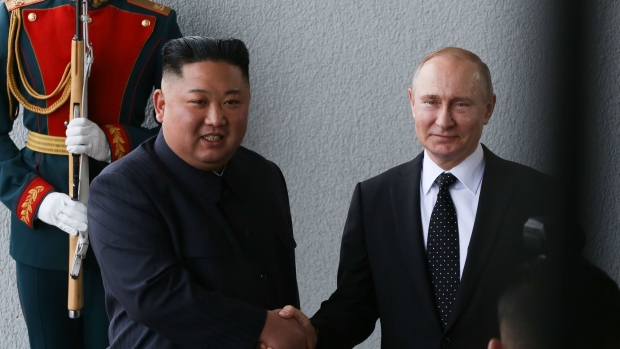Sep 7, 2023
Putin and Kim’s Meeting Shows the Limits of US Sanctions
, Bloomberg News

(Bloomberg) -- The US has warned that North Korea would pay a price for providing Russia with weapons for use in Ukraine, ahead of an expected rare meeting between Kim Jong Un and Vladimir Putin in Russia’s Far East.
But Washington has few points of leverage to deter two of the western world’s most implacable geopolitical foes from cementing ties. In comments to reporters this week, National Security Advisor Jake Sullivan said helping to arm Russia’s President Putin wouldn’t reflect well on North Korea and the US would “look for opportunities to dissuade” Kim’s regime from such a step.
That vague language underscored that Washington holds few options to change North Korea’s calculus. A raft of US sanctions over the years have failed to keep Kim from accelerating his nuclear weapons and ballistic missile programs. And he’s denied White House accusations that North Korea already has sent artillery shells from its stockpiles to help Moscow as Putin’s war in Ukraine grinds on and western sanctions erode Russia’s defense industrial base.
“Do we have leverage over North Korea? It doesn’t take a brain surgeon to figure out the answer is a resounding no,” said Joel Wit, a former State Department official who has negotiated with North Korean officials. “We have no leverage over North Korea at all, unless we want to start taking measures that might lead to a war, like intercepting their ships.”
Washington’s inability to force Pyongyang to change geopolitical course through sanctions highlights the complicated nature of US economic statecraft in an era when sanctioned countries, companies and individuals can continue to do business in shadowy parts of the global economy. That Russia is now going to North Korea and Iran for ammunition and drones, respectively, also speaks to the sometimes unintended consequences of the economic penalties — since all three nations remain heavily sanctioned by the US.
But it also says much about Russia’s dire situation in a war Putin had expected to win easily, according to Admiral Tony Radakin, chief of the UK defense staff. “If you’re Russia, and your way to try and manage this is to continue to cozy up to the likes of Iran and North Korea, that’s desperate,” Radakin said Thursday in remarks to the Hudson Institute in Washington.
Russia wouldn’t be the only party gaining from an accord at a Putin-Kim summit. In return, Pyongyang is likely seeking Russian support for its conventional weapons programs, and possibly advanced technology for satellites, nuclear-powered submarines and ballistic missiles, according to an analysis published by the Center for Strategic and International Studies in Washington.
“Even technical support by the Russian military to advance or modernize North Korea’s conventional forces could embolden Kim to adopt more coercive, even lethal use of force,” according to the report. It added: “The United States and its allies have limited policy options in addressing this new challenge.”
That hasn’t stopped Washington from repeatedly warning North Korea to drop plans to arm Russia.
John Kirby, spokesman for the White House National Security Council, has said that Russia has been forced to turn to “rogue regimes” for equipment “in part because of the sweeping sanctions and export controls that we have imposed.”
Kirby pointed to Aug. 16 sanctions against three entities as proof that the US “will continue to identify, expose, and counter Russian attempts to acquire military equipment” from North Korea. In March, the US also sanctioned a Slovakian national for facilitating Russia-North Korea arms deals.
Multilateral efforts at the United Nations have also faltered, given North Korea’s close relationships with China and Russia — which are both permanent members of the UN Security Council, giving them the power to veto US-backed resolutions recommending more sanctions.
North Korea’s constant ability to evade sanctions with new strategies and techniques — including deploying overseas information technology workers who can send revenue home from cyberattacks and other online crimes — paradoxically creates pressure to add still more sanctions.
With North Korea opening up after its Covid-era isolation, State Department officials fear some of these activities could increase, funneling new revenue to Kim’s regime at a time when its military partnership with Russia is deepening.
“One of the vital actions to counter current North Korea’s activity is to restrict the country’s cyber activities used to earn income and obtain sensitive information for the nuclear and missile programs,” said Maiko Takeuchi, who served the UN Security Council as a member of the Panel of Experts for North Korea for five years. “However, it is not happening in the near future, and North Korea’s aggressive cyber campaign will even be more intense after the border opening.”
--With assistance from Peter Martin.
©2023 Bloomberg L.P.





